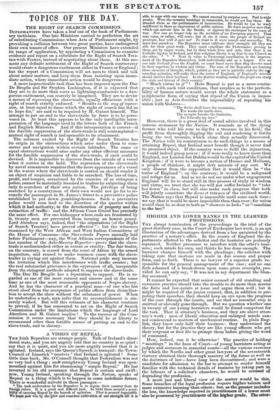TOPICS OF THE DAY.
THE RIGHT OF SEARCH COMMISSION.
DIPLOMATISTS have taken a leaf out of the book of Parliament- ary tacticians. Our late Ministers carried to perfection the art of substituting Commissions when Acts of Parliament might, by provoking a collision between two great parties, have endangered their own tenure of office. Our present Ministers have extended its range of application, by appointing a Commission to examine evidence and report on a substitute for the Right of Search Trea- ties with France, instead of negotiating about them. At this mo- ment any definite settlement of the Right of Search controversy would create a dangerous excitement either in France or England ; but the report of a Commission will set men to think and talk about minor matters, and keep them from insisting upon imme- diate action, where immediate action would be dangerous.
A more impracticable task than has been imposed upon the Duc De Broglie and Sir Stephen Lushington, if it is expected that they are to do more than serve as lightning-conductors to a dan- gerous excitement, can scarcely be imagined. They are to devise a means of repressing the slave-trade, equally efficacious with a right of search strictly enforced. " Results in the way of repres- sion, at least equal to those which the right of search has led us to hope for," are said to be required by M. Guizot himself. The attempt to put an end to the slave-trade by force is to be perse- vered in. At least this appears to be the only intelligible inter- pretation of the language used in the letters both of the French and English Ministers. And if this interpretation is correct—if the forcible suppression of the slave-trade is still contemplated— mutual right of search is indispensable to its attainment.
The soreness excited by the Right of Search Treaties has its origin in the obstructions which arise under them to com- merce and navigation within certain latitudes. The same or equal obstructions would arise under any other efficient measures for the forcible suppression of the slave-trade, if such could be .devised. It is impossible to discover from the outside of a vessel what it carries in the hold. The repression of the slave-trade by naval armaments requires that the mere appearance of a vessel in the waters where the slave-trade is carried on should render it an object of suspicion and liable to be searched. The loss of time, profit, and temper, occasioned by the exercise of so stringent a police, cannot be materially lessened to traders by subjecting them only to searchers of their own nation. The privilege of being searched by a countryman of their own would not go far to re- concile the passengers in St. James's Street to a preventive police established to put down gambling-houses. Such a preventive police would soon lead to the desertion of the quarter within which it had authority, to the deterioration of property and the extinction of traffic : and the African Coast Guard has precisely the same effect. For one kidnapper whose ends are frustrated by it, twenty men are prevented from turning an honest penny. Lord Aberdeen says, indeed, that "the stipulations [of the Right of Search Treaties] have proved effective " : but the witnesses examined by the West African and West Indian Committees of the House of Commons—the Slave-trade Papers annually laid before Parliament—nay, the West African correspondents of the last number of the Anti-Slavery Reporter—prove that the slave- trade is undiminished either in extent or cruelty. The fair trader, on the contrary, is scared from the coast of Africa by the armed inquisitors, and roused to make common cause with the slave- trader in crying out against them. National pride may increase the irritation which this interference with traffic creates ; but the real substantial grievance is the oppression of all, inseparable from the stringent methods adopted to suppress the slave-trade.
The Due De Broglie has a reputation to support. He is re- gardecl as one of the most earnest and sincere and at the same time . as one of the most reasonable opponents of Negro slavery. And he has the character of a practical man—of one who has stood aloof from the acceptance of public offices from disinclina- tion to accept the show without the substance of power. When he undertakes a task, men infer that its accomplishment is sin- cerely wished. But will this estimate of his character continue to prevail, if he has consented to act on the Right of Search Commission under the limitations which the language of Lord Aberdeen and M. Guizot implies ? To the success of the Com- mission it seems necessary that they should be at liberty to recommend other than forcible means of putting an end to the slave-trade, and to slavery.


























 Previous page
Previous page